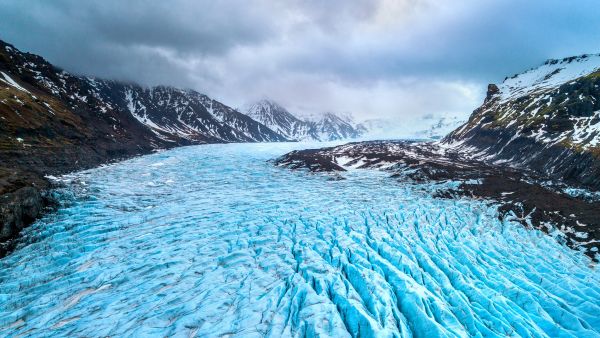Switzerland's glaciers have lost a tenth of their volume in the past five years alone — a rate of melting that is unprecedented in more than a century of observations.
The 'record levels' of melt this year were reported by the Cryospheric Commission at the Swiss Academy of Sciences based on measurements of 20 glaciers.
Their annual study of the state of Switzerland's glacier ice found that summer heatwaves dashed hopes that a snow-filled winter would offset this year's melt.
According to the commission, snow cover on the glaciers was around 20–40 per cent higher than usual in April and May this year, with depths of up to six metres measured in some places as late as June.
However, this build-up was undermined by two weeks of intense heat at the end of June and a similar episode that hit in late July.
'The volume of snow and ice melting on Swiss glaciers [...] was equivalent to the country's total annual consumption of drinking water,' the commission reported.
As the result, the thick snow layer quickly disappeared and the strong melt continued into early September.
{"preview_thumbnail":"https://cdn.flowplayer.com/6684a05f-6468-4ecd-87d5-a748773282a3/i/v-i-d…","video_id":"d261584e-e755-44f4-954b-20c2bd420608","player_id":"8ca46225-42a2-4245-9c20-7850ae937431","provider":"flowplayer","video":"US Withdraws All Troops From Northern Syria"}
'This means that, over the past 12 months, around two percent of Switzerland's total glacier volume has been lost,' the commission said.
The rate of glacial loss over the past five years 'exceeds 10 per cent', they added.
This melting marks 'a rate of decline never previously observed in the time series extending back for more than a century,' the commission added.
The report comes less than a month after a 'funeral march' was undertaken up a steep mountainside to mark the disappearance of the Pizol glacier — one of more than 500 glaciers to vanish from the Swiss Alps since the turn of the 20th century.
A recent study by from ETH Zurich also indicated that more than 90 per cent of the some 4,000 glaciers dotted throughout the Alps could disappear by the end of this century if greenhouse gas emissions are not reduced.
Last week, released aerial photographs revealed how much ice Mont Blanc, the highest mountain in the Alps, had lost in the past 100 years.
A photograph taken in 1919 was recreated this year, showing the top of the mountain and highlighting the toll that climate change has taken on it.
Patches of white ice had visibly shrunk and now appeared as barren land.
A scientist using multiple GPS devices to find the exact point from which the photograph was taken — while hanging out of a helicopter with his camera — took the shot in back August.
The team behind the image said that unless action is taken to slow down climate change, 2119's photograph might show almost no ice at all.
This article has been adapted from its original source.








